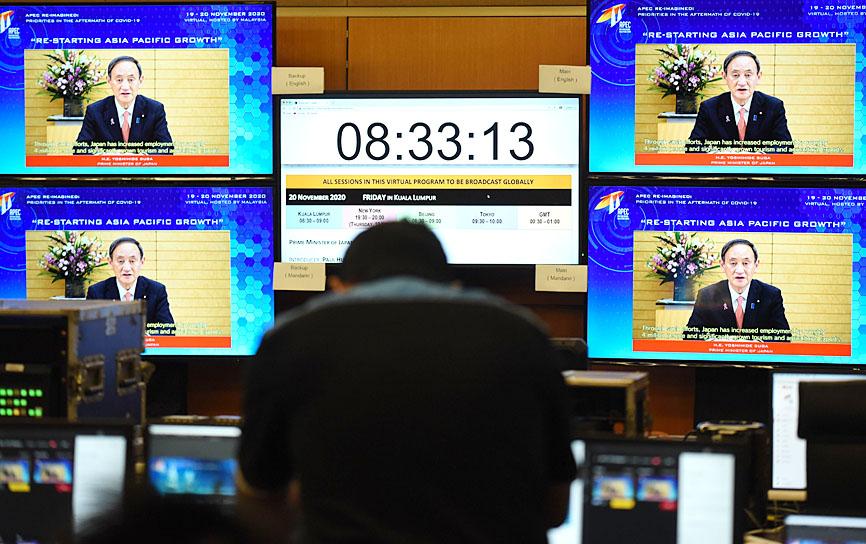Tokyo aims to expand the Comprehensive and Progressive Agreement for Trans-Pacific Partnership (CPTPP), a major regional free-trade pact, Japanese Prime Minister Yoshihide Suga said yesterday, potentially catering to China’s and Britain’s interest in joining the deal.
The accord links 11 nations, including Canada, Australia and Japan.
“Japan will aspire for the Free Trade Area of the Asia-Pacific through the early conclusion of the RCEP [Regional Comprehensive Economic Partnership] agreement and the steady implementation and expansion of the CPTPP as next year’s chair,” Suga said in a comment in a pre-recorded video message delivered at the APEC CEO Dialogues, ahead of a leaders’ virtual summit later in the day.

Photo: AFP / Malaysia’s Department of Information
The RCEP is the world’s largest free-trade deal, signed this month by 15 economies, while the Free Trade Area of the Asia-Pacific is potentially an even larger pact the 21-member APEC has been aspiring to.
A spokesman for the Chinese Ministry of Commerce on Thursday said that Beijing was open to the idea of joining the CPTPP, while Britain earlier this year announced its intent to pursue accession to the pact.
Chinese Minister of Foreign Affairs Wang Yi (王毅) is scheduled to travel to Tokyo next week, marking the first high-level visit between the two countries since the outbreak of the COVID-19 pandemic, Japanese Minister of Foreign Affairs Toshimitsu Motegi said at a regular briefing yesterday.
Suga also reiterated his key policy priorities — digital transformation and reduction of greenhouse gases.
“As people’s behavioral patterns shift due to COVID-19, accelerating digital transformation is crucial,” he said.

CHIP RACE: Three years of overbroad export controls drove foreign competitors to pursue their own AI chips, and ‘cost US taxpayers billions of dollars,’ Nvidia said China has figured out the US strategy for allowing it to buy Nvidia Corp’s H200s and is rejecting the artificial intelligence (AI) chip in favor of domestically developed semiconductors, White House AI adviser David Sacks said, citing news reports. US President Donald Trump on Monday said that he would allow shipments of Nvidia’s H200 chips to China, part of an administration effort backed by Sacks to challenge Chinese tech champions such as Huawei Technologies Co (華為) by bringing US competition to their home market. On Friday, Sacks signaled that he was uncertain about whether that approach would work. “They’re rejecting our chips,” Sacks

NATIONAL SECURITY: Intel’s testing of ACM tools despite US government control ‘highlights egregious gaps in US technology protection policies,’ a former official said Chipmaker Intel Corp has tested chipmaking tools this year from a toolmaker with deep roots in China and two overseas units that were targeted by US sanctions, according to two sources with direct knowledge of the matter. Intel, which fended off calls for its CEO’s resignation from US President Donald Trump in August over his alleged ties to China, got the tools from ACM Research Inc, a Fremont, California-based producer of chipmaking equipment. Two of ACM’s units, based in Shanghai and South Korea, were among a number of firms barred last year from receiving US technology over claims they have

It is challenging to build infrastructure in much of Europe. Constrained budgets and polarized politics tend to undermine long-term projects, forcing officials to react to emergencies rather than plan for the future. Not in Austria. Today, the country is to officially open its Koralmbahn tunnel, the 5.9 billion euro (US$6.9 billion) centerpiece of a groundbreaking new railway that will eventually run from Poland’s Baltic coast to the Adriatic Sea, transforming travel within Austria and positioning the Alpine nation at the forefront of logistics in Europe. “It is Austria’s biggest socio-economic experiment in over a century,” said Eric Kirschner, an economist at Graz-based Joanneum

France is developing domestic production of electric vehicle (EV) batteries with an eye on industrial independence, but Asian experts are proving key in launching operations. In the Verkor factory outside the northern city of Dunkirk, which was inaugurated on Thursday, foreign specialists, notably from South Korea and Malaysia, are training the local staff. Verkor is the third battery gigafactory to open in northern France in a region that has become known as “Battery Valley.” At the Automotive Energy Supply Corp (AESC) factory near the city of Douai, where production has been under way for several months, Chinese engineers and technicians supervise French recruits. “They